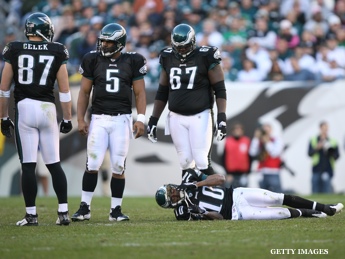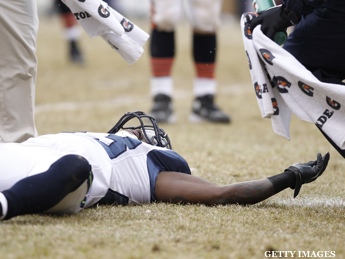Football players are nothing if not resilient. These men will play through heat, snow, rain and pretty much anything else Mother Nature throws at them.

While this endurance is admirable, and some of the most memorable football contests have come in unusual conditions, new research suggests playing in extreme weather could lead to increased risk of head injuries.
Over the past decade the helmet manufacturer Schutt, which produces the second-most popular brand of helmet in the NFL, has been shifting from traditional padding to Thermoplastic Urethane Cushioning (TPU). This material was first used in military helmets, and perhaps its signature claim is that it is more versatile than foam padding.
Glenn Beckman, director of marketing communications for Schutt, told Pro Football Weekly that the TPU Cushioning absorbs impact "more consistently" than foam padding.
Whereas foam padding hardens in cold weather and traps heat when temperatures rise, TPU Cushioning adapts to the conditions. This might prove especially helpful for players used to warm conditions. Wearing a helmet can trap heat and lead to a rise in body temperature, but Beckman says TPU Cushioning might help players avoid over-heating.
"The cushions inside our helmets are open-sided," Beckman told Weather.com. "There's far less area that's covered, so there's more space between the cushions. So there's a lot of air flowing through there. One of our goals is to help players control their core body temperatures as much as they can to give the excess heat a place to escape and to let the body cool itself."

While less frequent than heat-related injuries, concussions are also a cause for concern among football players at all levels. Schutt claims that TPU Cushioning's increased protection is better suited to protect against concussions, but because so little is understood about brain trauma, even Schutt executives admit it is still difficult to come away with answers.
"I don't believe that there's any single one test that will tell you whether a helmet can stop a concussion," Robert Erb, President and CEO, told the New York Times in 2010. "We communicate with coaches, equipment managers and other people in the football community. We have years of experience, test different conditions, temperatures, putting the helmets through a variety of contexts to see if it has superior dampening ability for a range of impacts.”




